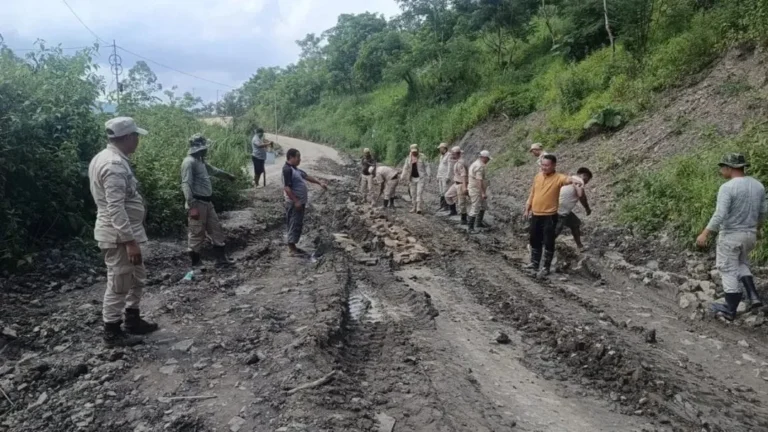Manipur Security Forces Eradicate 19 Acres of Poppy Plantation in Senapati District
Summary of the News Article
In a robust effort to combat illegal drug cultivation, security forces in Manipur, with support from forest officials and local authorities, destroyed 19 acres of poppy plantations in the Khabung hill range of the Senapati district. This operation utilized advanced drone technology to locate the fields and was overseen by an executive magistrate. Following this action, an FIR was filed, and investigations are underway to identify those responsible for the illegal cultivation.
Manipur’s Fight Against Illegal Poppy Cultivation: A Closer Look at the Senapati Operation
Introduction
Manipur, a state known for its lush greenery and rich cultural history, has long battled the issue of illegal poppy cultivation. While this beautiful state often draws attention for its scenic beauty, it also faces a less glamorous challenge—illegal narcotics production. This article dives deep into the recent destruction of 19 acres of poppy plantations in Senapati district, shedding light on how such efforts are critical to the state’s fight against drug production and abuse.
The Growing Issue of Poppy Cultivation in Manipur
Why Poppy Cultivation Persists
Why do farmers turn to poppy farming despite its illegality? Well, the answer often lies in desperation. Poppy plants, from which opium is derived, offer a lucrative yield compared to traditional crops. For farmers living in remote areas with limited economic opportunities, it can feel like the only way out of poverty.
But there’s a dark side. The profits might be high, but the consequences—both legal and social—are severe. These plantations feed into the larger narcotics trade, fueling addiction, crime, and societal breakdown.
Manipur’s Geographical Challenges
Manipur’s rugged terrain and vast forested areas make it an ideal hiding spot for illicit activities like poppy cultivation. The plantations are often scattered across remote regions, making detection and eradication an uphill battle. That’s where technology, like drones, becomes a game-changer.
Breaking Down the Senapati Operation
How It All Went Down
On January 10, 2025, a team comprising security forces, forest department officials, and local authorities took on the monumental task of eradicating poppy plantations in Senapati district. Using drones to scout the Khabung hill range, they pinpointed 19 acres of illegal plantations. The operation was led by the Additional Superintendent of Police (NH-2) and carried out under tight coordination.
This wasn’t just a one-off effort. It was a reflection of a larger, ongoing campaign by the state to curb illegal drug production.
Technology: A Game-Changer
Gone are the days when such operations relied solely on physical manpower. In this operation, drones provided aerial views of the challenging terrain, making it easier to locate and destroy scattered poppy fields. This technological edge not only saves time but also ensures the safety of the personnel involved.
Legal Follow-Up
After the destruction of the fields, an FIR was lodged, signaling the start of investigations to identify the individuals behind the cultivation. This step is crucial—not just to bring culprits to justice but also to deter others from engaging in similar activities.
The Bigger Picture: Why Eradication Matters
Societal Impact
Poppy cultivation isn’t just a legal problem—it’s a societal one. The drugs produced from these plantations contribute to addiction rates, tearing families apart and crippling communities. By destroying these fields, authorities are tackling the problem at its root.
Environmental Consequences
You might not think of illegal farming as an environmental issue, but it is. Poppy cultivation often involves deforestation and soil degradation, further harming Manipur’s already fragile ecosystem. Removing these plantations is a step toward restoring the balance.
Economic Alternatives
Eradication alone isn’t enough. To truly solve the problem, the state needs to provide farmers with viable alternatives. Programs that promote sustainable agriculture, livestock farming, or vocational training can offer a way out of the vicious cycle of illegal cultivation.
Challenges in Combating Poppy Cultivation
Remote Locations
Manipur’s hilly and forested terrain makes operations challenging. Accessing these areas often requires extensive planning and resources, not to mention the risks involved in confronting cultivators who might resist.
Economic Dependence
For many farmers, poppy farming isn’t a choice—it’s a necessity. Breaking this dependency means addressing the underlying issues of poverty and lack of economic opportunities.
Insufficient Resources
While the state is committed to eradication, the scale of the problem often outpaces the resources available. More funding, personnel, and technological support are needed to sustain these efforts.
What’s Next? A Multi-Pronged Approach to Solve the Problem
Strengthening Law Enforcement
Enhanced coordination between law enforcement agencies, along with regular monitoring of vulnerable regions, can keep illegal cultivation in check.
Promoting Awareness
Education is key. Informing farmers about the legal risks and societal consequences of poppy cultivation can discourage them from pursuing it.
Introducing Sustainable Farming Practices
Offering training and resources for alternative crops can give farmers a way to earn a living without turning to illegal activities. Crops like turmeric, ginger, or even medicinal plants can provide comparable profits with fewer risks.
Harnessing Technology
Investing in tools like drones, satellite imagery, and data analytics can improve the efficiency and accuracy of eradication efforts.
FAQs
- Why is poppy cultivation illegal in Manipur?
Poppy cultivation is illegal because it fuels the production of opium and narcotics, which have devastating social and legal consequences. - How do authorities locate hidden poppy plantations?
Advanced technologies like drones and satellite imagery are used to survey remote and rugged terrains, making it easier to locate hidden plantations. - What alternatives are available to farmers engaged in illegal cultivation?
Programs promoting sustainable agriculture, horticulture, and livestock farming provide viable economic alternatives for farmers. - How does poppy cultivation impact the environment?
Poppy farming often leads to deforestation, soil erosion, and loss of biodiversity, harming the environment. - What role do communities play in combating poppy cultivation?
Community engagement through awareness programs and local monitoring committees is crucial for creating a sustainable solution to the problem.



